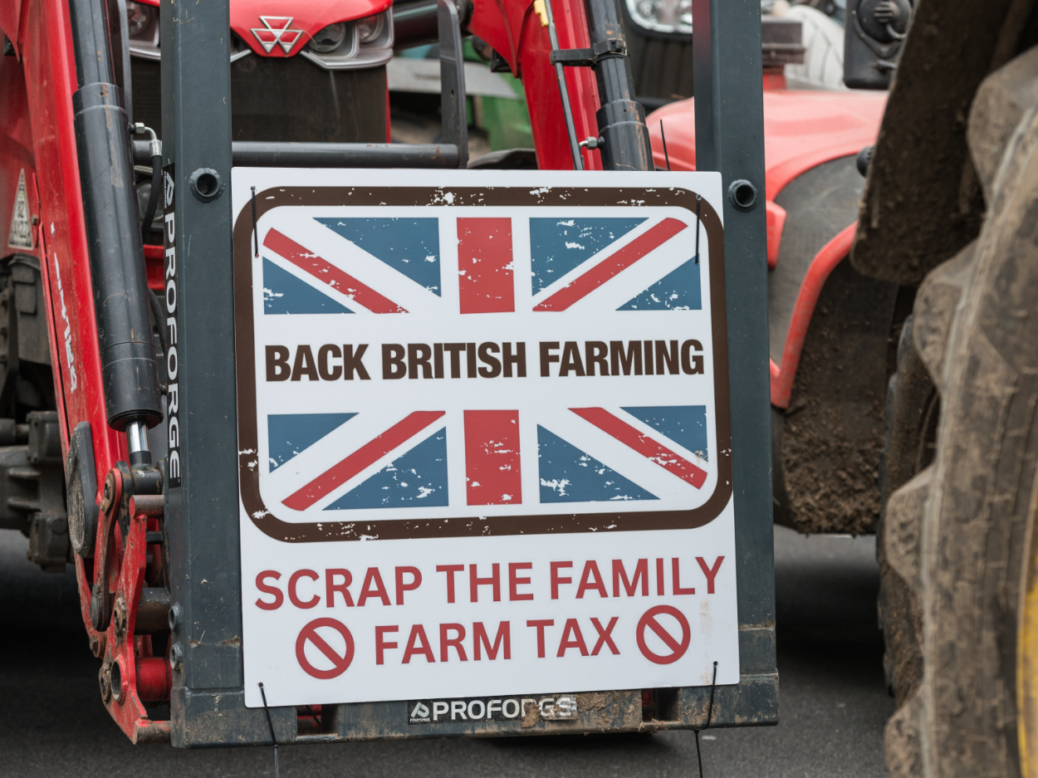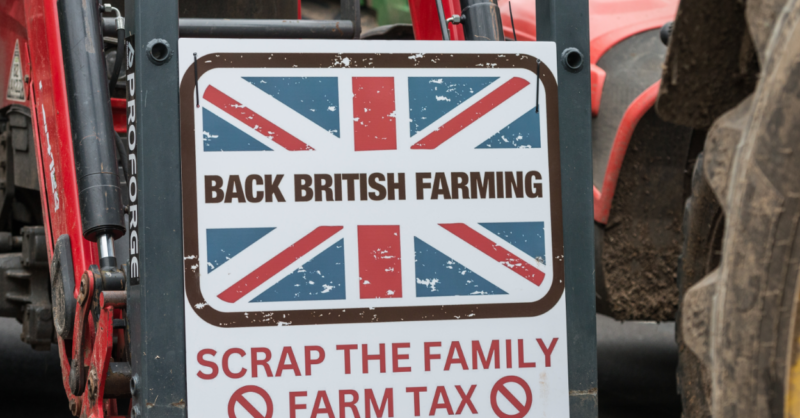
Campaigners have begun rallying under slogans such as ‘Back British Farming – Scrap the Family Farm Tax,’ protesting against the government’s decision to curtail inheritance tax relief on agricultural land // Image: Shutterstock, Mark Anthony Ray
The British are good at gallows humour. Which explains the somewhat wry suggestions in legal circles recently that, following the government’s decision to upend the longstanding relief on inheritance tax (IHT) on agricultural land, the best thing for elderly owners of farming estates to do is to marry their daughter-inlaw or son-in-law – ‘so long as the right pre- and post-nup are in place’, of course.
An even more extreme – and equally unserious – suggestion for tax mitigation is, ahem, to take the precaution of dying before 6 April 2026. In that case, one’s whole estate would still get passed on tax-free. ‘We do give clients that option,’ chirps one lawyer, a bit too cheerfully.
Unfortunately, the jokes might also serve as a grim reminder that the suicide rate for farmers was already among the highest in Britain, even before Rachel Reeves announced her reform of agricultural protection relief (APR) and business protection relief at the Budget in 2024. The upshot is that from next April landowners will face a 20 per cent IHT bill on all agricultural land over the value of £1 million.
Down at the Hampshire office of legal firm Moore Barlow, they’re using a notional case study to illustrate the challenge for landowning clients. A 600-acre ‘vanilla Hampshire farm’ valued at £9.5 million is owned by a Bob and Belinda, both in their nineties, and makes an annual profit of £15,000-£45,000. If Bob were to die before April and pass the estate to Belinda, who then died after April – once the new IHT regime is in place – then their son Billy would face a £1.44 million tax bill. That this can be spread over ten annual payments (a snip at £144,000 a year) highlights the issue – there’s no way on God’s green earth, even if the soil is incredibly productive, that their notional farm can support that.
‘Farms like this will end up having to be sold or partitioned to pay off the tax bill,’ warns Sarah Jordan, a landed estate partner at the firm. She notes that much of the land released to market will go for housing or renewables and adds: ‘The bigger picture is that this affects our food production and our food security.’
See also: Britain at risk of losing its wealthy elite as confidence in regime collapses
 Rachel Reeves has been urged to consider alternatives to the family farm tax, amid concerns that the reforms could force sales of smaller estates and disrupt British food production // Image: Shutterstock, Fred Duval
Rachel Reeves has been urged to consider alternatives to the family farm tax, amid concerns that the reforms could force sales of smaller estates and disrupt British food production // Image: Shutterstock, Fred Duval
The problem is especially acute for small and medium-sized agricultural estates where there are elderly owners – regarded as anyone over 70 – or those in poor health, because they won’t necessarily be able to take advantage of the seven-year rule on tax-free gifting to pass their land on.
See also: the best accountants and tax advisers in 2025
Content from our partners
But even for those who are confident they’ve got the years left on the clock, gifting is not necessarily going to work, says Sabrina Sears from the private wealth and tax team at Mishcon de Reya. What if your child is going through a divorce or is simply not yet ready to inherit the land? Therefore landowners are exploring options such as life insurance – to provide the liquidity to pay the IHT bill when the time comes – or passing land on to the next generation in trust now. This doesn’t avoid IHT but offers control and can allow heirs to spread the IHT charge over 70 years (reducing the liability to a more manageable 0.3 per cent a year). Even so, this will drive many out of the sector. Some say it’s already happening – rural estate experts at Stoneacre Advisors say they are observing ‘an increase in farmland supply as smaller landowners bring forward their retirement plans’.
Idina Glyn, a partner specialising in landed estates at Mishcon, says she handled six transactions the day before the last Budget in anticipation of changes, as ‘empire-building’ estates sought to use the tax changes as an opportunity to snap up increasingly unviable smaller holdings.
While Glyn believes the tax changes will lead to ‘short-term and ongoing pain as smaller businesses are forced out of the market’, she remains ‘cautiously positive about the benefits of large landowners and the opportunity [they] could bring in increased professionalisation’ to the sector, as well as investment. ‘But that needs to be balanced against the drawbacks of losing the benefits of small, local farms and allowing people to come in,’ she adds.
What’s clear is that landowners across the length and breadth of the country are rushing to have their estates valued – to accurately calculate their tax liabilities – and are consulting solicitors over wills and the restructuring of agricultural assets. All this is being done with a hard deadline looming on 6 April 2026.
Despite the tax changes, agricultural land remains an attractive asset, especially in comparison with assets that don’t attract any reliefs, says Marcus Maxwell of Farrer & Co. ‘The value that clients find in agricultural land will still be there,’ he says. ‘It just won’t be quite as attractive as it was before.’ What’s more, as one agent told me, all the angry placard-waving over reform of APR has served to increase awareness of agricultural land ‘because lots of people didn’t even know that the reliefs existed’. That’s small comfort to those being pushed out, but is proof positive that farmland has a future.



